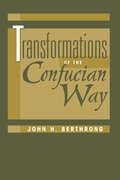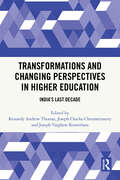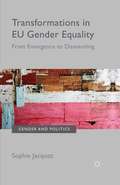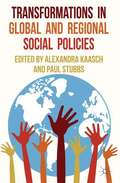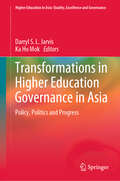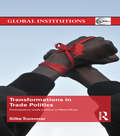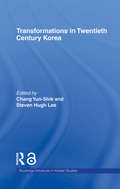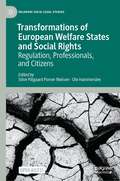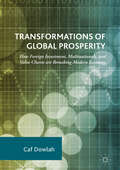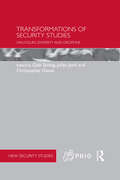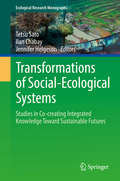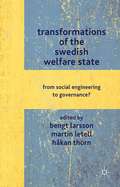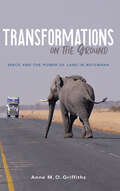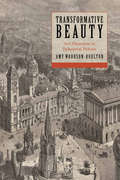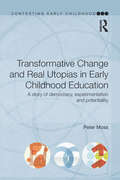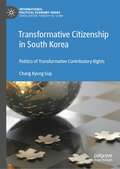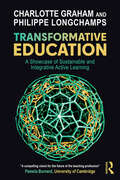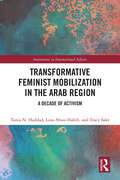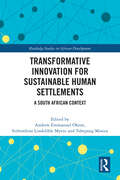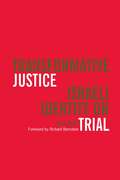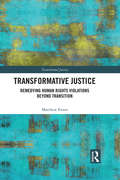- Table View
- List View
Transformations Of The Confucian Way
by John BerthrongFrom its beginnings, Confucianism has vibrantly taught that each person is able to find the Way individually in service to the community and the world. John Berthrongs comprehensive new work tells the story of the grand intellectual development of the Confucian tradition, revealing all the historical phases of Confucianism and opening the readers eyes to the often neglected gifts of scholars of the Han, Tang, and the modern periods, as well as to the vast contributions of Korea and Japan. The author concludes his revelatory study with an examination of the contemporary renewal of the Confucian Way in East Asia and its spread to the West. }From its beginnings, Confucianism has vibrantly taught that each person is able to find the Way individually in service to the community and the world. For over 2,600 years, Confucianism has sustained a continual process of transformation and growth. In this comprehensive new work, John Berthrong examines the vitality and expansion of the Confucian tradition throughout East Asia and into the entire modern world. Confucianism has been credited with being the dominant social and intellectual force shaping the enduring civilizations of East Asia. If we are to grasp the history of East Asia, we must understand the role that Confucianism has played in the social and cultural formation of the entire region. Just as civilizations are ever-changing, there has been nothing timeless or static about Confucianism.Berthrongs study is unique in its discussion of each of the historical and regional phases of the development of the Confucian Tao. All too often, Confucian studies have focused exclusively on the classical early period and the great thinkers of the later neo-Confucian revival in the Sung Ming dynasties. Berthrongs work opens the readers eyes to the often neglected gifts of scholars of the Han, Tang, and the modern periods, as well as to the vast contributions of Korea and Japan. The author concludes this revelatory study with an examination of the contemporary renewal of the Confucian Way in East Asia and its recent spread to the West. }
Transformations and Changing Perspectives in Higher Education: India's Last Decade
by Joseph Varghese Kureethara Kennedy Andrew Thomas Joseph Chacko ChennattuserryThis book reveals the intricacies of the Indian education system, especially those that surged in the past decade. It covers several perspectives of global higher education, wherein the dynamic trends and frameworks are explicated for a better understanding of the curriculum design and delivery of higher education in India. It facilitates students’ learning and experiences, wherein the post-pandemic insights for learning from remote locations could be gleaned.This volume looks at the complexities in the functioning of educational institutions and suggests novel approaches and interventions that are crucial for the educational framework of India. It attempts to draw theoretical implications of the educational system and uses empirical evidence for recommending actionable processes.As a multidisciplinary work covering international policies and global perspectives on higher education, this book would be useful to students, teachers of education, political science, public administration, international relations, economics, psychology, cognitive science, life skills education, counselling, sociology, gender studies, social work, performing arts, and disaster management. It will also be an indispensable resource for researchers, academicians, professionals, government and policy makers of the country and the world at large.
Transformations in Africana Studies: History, Theory, and Epistemology
by Adebayo OyebadeThis book introduces readers to the rich discipline of Africana Studies, reflecting on how it has developed over the last fifty years as an intellectual enterprise for knowledge production about Africa and the African diaspora. The African world has always had a wealth of indigenous knowledge systems, but for the greater part of the scholarly history, hegemonic Western epistemologies have denied the authenticity of African indigenous ways of knowing. The post-colonial era has seen steady and deliberate efforts to expand the frontiers of knowledge about black people and their societies, and to Africanize such bodies of knowledge in all fields of human endeavor. This book reflects on how the multidisciplinary discipline of Africana Studies has transformed and reinvented itself as it has sought to advance knowledge about the African world. The contributors consider the foundations of the discipline, its key theories and methods of knowledge production, and how it interacts with popular culture, Women’s Studies, and other area studies such as Ethnic and Afro-Latinix Studies. Bringing together rich insights from across history, religion, literature, art, sociology, and philosophy, this book will be an important read for students and researchers of Africa and Africana Studies.
Transformations in EU Gender Equality: From emergence to dismantling (Gender and Politics)
by Sophie JacquotIn a context of economic and budgetary crisis, this book presents a long-term analysis of the transformations of EU gender equality. It analyses the mechanisms of construction, consolidation and deconstruction of this policy and questions the effects of its current dismantling.
Transformations in Global and Regional Social Policies
by Paul Stubbs Alexandra KaaschThis book discusses key issues in global and regional social policy, exploring Bob Deacon's pioneering approach to regulation, rights and redistribution. It addresses the role of international actors in shaping social policy and discusses the problems and possibilities of new alliances for global social justice.
Transformations in Higher Education Governance in Asia: Policy, Politics and Progress (Higher Education in Asia: Quality, Excellence and Governance)
by Ka Ho Mok Darryl S. L. JarvisThis book documents experimentation with various policy and governance approaches that produce structural differences in the composition and organisation of Asia’s higher education systems. In view of the wide variation in the public and private provision of higher education, it showcases how issues of access, equity and modes of participation are addressed, how institutional and programme quality are managed and how academic labour is treated and developed. The book both maps these differences and analyses the country-level dynamics, policy approaches and the problems faced by a variety of states in Asia in the race to develop competitive higher education systems. Focusing on the intersection of governance and higher education policy, it addresses the challenges facing higher education in Asia and the national responses of governments in terms of the organisation of the sector.
Transformations in Research, Higher Education and the Academic Market: The Breakdown of Scientific Thought
by Alexandra Waluszewski Sharon Rider Ylva HasselbergThis volume tackles head-on the controversy regarding the tensions between the principles underlying Academe on the one hand, and the free market on the other. Its outspoken thesis posits that seemingly irresistible institutional pressures are betraying a core principle of the Enlightenment: that the free pursuit of knowledge is of the highest value in its own right. As 'market principles' are forced on universities, inducing a neoteric culture of 'managerialism', many worry that the very characteristics that made European higher education in particular such a success are being eroded and replaced by ideological opportunism and economic expediency. Richly interdisciplinary, the anthology explores a wealth of issues such as the phenomenon of bibliometrics (linking an institution's success to the volume and visibility of publications produced). Many argue that the use of such indicators to measure scientific value is inimical to the time-consuming complexities of genuine truth-seeking. A number of the greatest discoveries and innovations in the history of science, such as Newton's laws of mechanics or the Mendelian laws of inheritance, might never have seen the light of day if today's system of determining and defining the form and content of science had dominated. With analytical perspectives from political science, economics, philosophy and media studies, the collection interrogates, for example, the doctrine of graduate employability that exerts such a powerful influence on course type and structure, especially on technical and professional training. In contrast, the liberal arts must choose between adaptation to the dictates of employability strategies or wither away as enrollments dwindle and resources evaporate. Research projects and aims have also become an area of controversy, with many governments now assessing the value of proposals in terms of assumed commercial benefits. The contributors argue that these changes, as well as 'reforms' in the managerial and administrative structures in tertiary education, constitute a radical break with the previous ontology of science and scholarship: a change in its very character, and not merely its form. It shows that the 'scientific thinking' students, researchers, and scholars are encouraged to adopt is undergoing a rapid shift in conceptual content, with significant consequences not only for science, but also for the society of which it is a part.
Transformations in Trade Politics: Participatory Trade Politics in West Africa (Global Institutions)
by Silke TrommerThis book examines the evolution and application of participatory trade politics in West Africa and discusses the theoretical implications for political economy and global governance approaches to trade policy-making. The author traces the involvement of a network of West African global justice Non-Governmental Organizations (NGO), local NGO and movement platforms, and trade unions in the negotiations for an Economic Partnership Agreement with the European Union. Building on this empirical analysis, she develops a theoretical framework of trade policy formation that is not limited to conceptualizing trade as a policy field aimed exclusively at regulating exporting and importing activities in the global economy. Instead, she analyzes how material and ideational spheres interact in the way in which communities set the rules that enable them to trade across long distances. Attempting to reconcile demands for inclusivity with current economic policy-making, the author reframes the way in which we theoretically pose questions of who makes trade policy decisions, through which mechanisms and why trade policy-making practices change, or resist change. Transformations in Trade Politics will be of interest to students and scholars of International Political Economy, Global Governance, Social Movement Studies, International Economic Relations, International Trade Relations, African Politics, The Politics of African/International Development, EU politics and EU-African Relations.
Transformations in Twentieth Century Korea (Routledge Advances in Korean Studies #Vol. 7)
by Steven Hugh Lee Chang Yun-ShikThis edited collection traces the social, economic, political, and cultural dimensions of Korea’s dramatic transformation since the late nineteenth century. Taking an interdisciplinary approach, the chapters examine the internal and external forces which facilitated the transition towards industrial capitalism in Korea, the consequences and impact of social change, and the ways in which Korean tradition continues to inform and influence contemporary South Korean society. Transformations in Twentieth Century Korea employs a thematic structure to discuss the interrelated elements of Korea’s modernization within agriculture, business and the economy, the state, ideology and culture, and gender and the family. The essays in this volume encompass the Choson dynasty, the colonial period, and postcolonial Korea. Collectively, they provide us with an original and innovative approach to the study of modern Korea, and show how knowledge of the country’s past is critical to understanding contemporary Korean society. With contributions from a number of prominent international scholars within sociology, economics, history, and political science, Transformations in Twentieth Century Korea incorporates a global framework of historical narrative, ideology and culture, and statistical and economic analysis to further our understanding of Korea’s evolution towards modernity.
Transformations of European Welfare States and Social Rights: Regulation, Professionals, and Citizens (Palgrave Socio-Legal Studies)
by Ole Hammerslev Stine Piilgaard Porner NielsenThis open access edited book investigates European social rights in practice from socio-legal perspectives. It brings together fourteen socio-legal scholars, representing Nordic and Western European countries, who analyse different aspects pertaining to European social rights, namely the regulation of social rights, encounters between welfare professionals and citizens, and citizens’ mobilisation of social rights. These three different aspects from the structure for the sections in the anthology, each analysing transformations related to regulation, encounters and rights mobilisation. The book contributes to the existing literature as it focuses on interdependent transformations on macro, meso and micro levels which are key for understanding processes and contexts related to European social rights in practice. It speaks particularly to academics in sociology of law and/or regulation.
Transformations of Global Prosperity: How Foreign Investment, Multinationals, And Value Chains Are Remaking Modern Economy
by Caf DowlahThis book presents an in-depth understanding of the transformation of modern economy in the twenty-first century by examining the interface and interplay of three key forces of contemporary global economy—Foreign Direct Investment (FDI), Multinational Enterprises (MNEs), and Global Value Chains (GVCs)—and how the emerging nexus of these forces has already ushered in revolutionary transformation in global production, investment, trade, and employment in recent decades. A distinctive feature of the book is that it situates the contemporary GVC revolution—that envisages fragmentation and dispersion of production processes across the world based on competitive costs and quality—as a natural progression of the traditional FDIs-MNEs nexus, which emphasized internationalization of production and trade in search of profits, resources, markets, or cheap labour. Moreover, the book provides a comprehensive analysis, from historical, theoretical and empirical perspectives, of both traditional FDIs-MNEs Nexus that dominated the world economy until the end of the twentieth century, and of the New Nexus of FDIs-MNEs-GVCs, that has opened grand opportunities for global prosperity by providing short-cut paths to industrialization and economic growth for less developed countries. As an exemplar, the book examines GVCs in automobiles—a medium-tech manufacturing activity with numerous backward and forward linkages—to demonstrate how the FDI-MNE-GVC interface in this sector has wedged industrialization, employment, and trade in six emerging countries/regions—Brazil, Central and Eastern Europe, China, India, Mexico and Thailand.
Transformations of Security Studies: Dialogues, Diversity and Discipline (PRIO New Security Studies)
by Christopher Daase Gabi Schlag Julian JunkThis volume brings together a group of distinguished scholars to engage in a dialogue on key developments in the study of security. The book provides a comprehensive overview of theoretical, empirical and methodological developments within security studies, whose political and societal importance has grown significantly in recent years. By bringing together scholars who hold differing perspectives on security, this volume provides insights into a variety of approaches and their newest developments, including ‘mainstream’ as well as heterodox perspectives on security. Thus, it aims to build bridges of communication between different ‘camps’ by initiating a dialogue on the identity and diversity of security studies. It does so in three parts: The first part of the book includes paradigmatic approaches to security that are closely connected to major debates in International Relations such as realism, institutionalism, constructivism as well as approaches to the culture, ethics of security and critical security studies. The second part places emphasis on the broadening and deepening of the concept of security in recent decades. It discusses key empirical frontiers including the continued centrality of the state, the link between democracy and security, environmental security as well as financial security. The third part of the book presents various methodological approaches to the question of security and peace. It provides an overview of new approaches such as the visual turn, quantifying security and method combinations. This book will be of much interest to students of critical security studies, international relations and research methods.
Transformations of Social-Ecological Systems: Studies in Co-creating Integrated Knowledge Toward Sustainable Futures (Ecological Research Monographs)
by Tetsu Sato Ilan Chabay Jennifer HelgesonThrough this book, readers will gain a comprehensive overview of transdisciplinary knowledge co-production in local contexts as an issue-driven and solution-oriented process, and will come to understand its relationship to societal transformation processes toward sustainability. In a single volume, the theory, approaches and academic implications of this novel type of knowledge production are addressed, together with its societal impacts.In the midst of global anthropogenic impacts that affect various environments, over the past few decades we have observed autonomous initiatives in local communities around the world to tackle these environmental challenges. It is vital that such local actions be scaled up to achieve sustainable societies, which requires societal transformation on larger scales. Thanks to numerous collaborative actions in local communities, transdisciplinary knowledge co-production among diverse stakeholders has successfully been mobilized, resulting in the development of Integrated Local Environmental Knowledge (ILEK); knowledge that can inform and support decisions and actions promoting the sustainable transformation of society. This book uses comparative case studies in communities around the world to illuminate and clarify processes and factors promoting the co-production and utilization of ILEK to facilitate decision-making. In addition, readers will gain deeper insights into the science-society interactions that can contribute to finding collaborative solutions to a wide range of critical environmental problems. Though the book is ideally suited for researchers and students, it also offers a valuable resource for practitioners, government agencies, and stakeholder agencies.
Transformations of the Swedish Welfare State
by Håkan Thörn Bengt Larsson Martin LetellUsing an analytical framework based on Foucault's concept of governmentality and through unique case-studies, this volume explores the ongoing transformations taking place in the Swedish welfare state.
Transformations on the Ground: Space and the Power of Land in Botswana (Framing the Global)
by Anne M. GriffithsA study of Botswana’s dual face of prosperity and poverty and that relates to its land use policies.Transformations on the Ground considers the ways in which power in all its forms—local, international, legal, familial—affects the collision of global with local concerns over access to land and control over its use. In Botswana’s struggle to access international economies, few resources are as fundamental and fraught as control over land. On a local level, land and control over its use provides homes, livelihoods, and the economic security to help lift populations out of impoverishment. Yet on the international level, global capital concerns compete with strategies for sustainable development and economic empowerment. Drawing on extensive archival research, legal records, fieldwork, and interviews with five generations of family members in the village of Molepolole, Anne M. O. Griffiths provides a sweeping consideration of the scale of power from global economy to household experience in Botswana. In doing so, Griffiths provides a frame through which the connections between legal power and local engagement can provide fresh insight into our understanding of the global.“Botswana is a darling of international donors and regularly praised as an upwardly mobile, prosperous and successful country. At the same time, it is characterized by poverty and exclusion, especially of women. In her insightful case study on land politics, Anne Griffiths effectively contrasts the image of a coherent state against myriad realities and confusion of competences on the ground. Based on decades of ethnographic fieldwork, this book masterfully demonstrates how in the realm of land and law, international, national, regional and local domains intersect and overlap, and come into conflict with one another.” —Andreas Eckert, Humboldt University Berlin“Anne Griffiths’ ambitious and original book reveals how the “global” is always situated in specific places and times through her insightful analysis of how land in Botswana has figured in practices, policy and politics from the standpoints of household, family, village, district, national and international levels. Griffiths’ astute use of political and legal history, legal documents, observation of statutory and customary law settings, multi-generational life histories and detailed ethnography enable her to provide a rich and informative account that goes well beyond the mantra of “the global in the local.” While insisting on foregrounding “the voices, perceptions, and experiences of people’s relationships with land,” Griffiths shows how these interact with national politics, policies, laws and legal practice and with the effects of international and global agencies and processes to produce inequality and class differences, despite some improvement in gendered patterns of land entitlement.” —Pauline Peters, Faculty Associate, Harvard Kennedy School and Center for African Studies
Transformationsprozesse am Fluchtort Stadt
by Joachim Schroeder Mariam Arouna Ingrid Breckner Umut Ibis Hazal Budak-Kim Frauke MeyerDiese Publikation untersucht „Transformationsprozesse am Fluchtort Stadt“, die sich vor und nach der verstärkten Fluchtzuwanderung im Untersuchungsraum Hamburg der Jahre 2015/2016 nachweisen lassen. Kenntnisleitend war dabei die Frage, inwiefern Flucht und Zuwanderung von Geflüchteten nicht mehr nur als vorübergehende und kurzfristige Phänomene betrachtet und als Reaktion auf einen „Ausnahmezustand“ gedacht werden, sondern auch auf institutionellen/strukturellen Ebenen Transformationen auslösen und deshalb in regulärer Stadtpolitik und Stadtentwicklung zu berücksichtigen sind.Der theoretische Zugang erfolgte entsprechend der interdisziplinären Ausrichtung des Projekts mit einer wechselseitigen Bezugnahme auf bildungstheoretische, stadtsoziologische und migrationstheoretische Überlegungen. Empirisch wurden zunächst Transformationsprozesse administrativer und institutioneller Strukturen und deren Spuren in den Lebenslagen Geflüchteter in den Blick genommen. Abschließend erfolgt eine kontrastierende Diskussion der Hamburger Befunde zu den vielfach bundesweit als vorbildlich beurteilten kommunalen Strategien und Praktiken des Umgangs mit Flucht*Migration in Schwäbisch Gmünd sowie eine Reflexion ethischer Fragen in der wissenschaftlichen Untersuchung von Flucht*Migration.
Transformative Beauty: Art Museums in Industrial Britain
by Amy Woodson-BoultonWhy did British industrial cities build art museums? By exploring the histories of the municipal art museums in Birmingham, Liverpool, and Manchester, Transformative Beauty examines the underlying logic of the Victorian art museum movement. These museums attempted to create a space free from the moral and physical ugliness of industrial capitalism. Deeply engaged with the social criticism of John Ruskin, reformers created a new, prominent urban institution, a domesticated public space that not only aimed to provide refuge from the corrosive effects of industrial society but also provided a remarkably unified secular alternative to traditional religion. Woodson-Boulton raises provocative questions about the meaning and use of art in relation to artistic practice, urban development, social justice, education, and class. In today's context of global austerity and shrinking government support of public cultural institutions, this book is a timely consideration of arts policy and purposes in modern society.
Transformative Change and Real Utopias in Early Childhood Education: A story of democracy, experimentation and potentiality (Contesting Early Childhood)
by Peter MossEarly childhood education and care is a major policy issue for national governments and international organisations. This book contests two stories, both infused by neoliberal thinking, that dominate early childhood policy making today - ‘the story of quality and high returns’ and ‘the story of markets’, stories that promise high returns on investment if only the right technologies are applied to children and the perfection of a system based on competition and individual choice. But there are alternative stories and this book tells one: a ‘story of democracy, experimentation and potentiality’ in which early childhood centres are public spaces and public resources, places where democracy and experimentation are fundamental values, community workshops for realising the potentiality of citizens. This story calls for transformative change but offers a real utopia, both viable and achievable. The book discusses some of the conditions needed for the story’s enactment and shows what it means in practice in a chapter about project work contributed by a Swedish preschool teacher. Critical but hopeful, this book is an important contribution to resisting the dictatorship of no alternative and renewing a democratic politics of early childhood education. It is essential reading for students and teachers, researchers and other academics, and for all other concerned citizens.
Transformative Citizenship in South Korea: Politics of Transformative Contributory Rights (International Political Economy Series)
by Chang Kyung-SupSouth Korea’s postcolonial history has been replete with dramatic societal transformations through which it has emerged with a fully blown modernity, or compressed modernity. There have arisen the transformation-oriented state, society, and citizenry for which each transformation becomes an ultimate purpose in itself, its processes and means constitute the main sociopolitical order, and the transformation-embedded interests form the core social identity. A distinct mode of citizenship has thereby arisen as transformative contributory rights, namely, effective or legitimate claims to national and social resources, opportunities, and respects that accrue to each citizen’s contributions to the nation’s or society’s collective transformative goals. South Koreans have been exhorted or have exhorted themselves to intensely engage in such collective transformations, so that their citizenship is framed and substantiated by the conditions, processes, and outcomes of such transformative engagements. This book concretely and systematically analyzes how this transformative dynamic has shaped South Koreans’ developmental, social, educational, reproductive, and cultural citizenship.
Transformative Education for Regeneration and Wellbeing: A Critical Systemic Approach to Support Multispecies Relationships and Pathways to Sustainable Environments (Contemporary Systems Thinking)
by Yvonne Corcoran-Nantes Janet J. McIntyre-MillsThe edited volume advocates for teaching systemic ethics as a form of life-long learning within nature’s classroom to support social and environmental justice. This book also explains critical systemic thinking as both an individual and a collective responsibility through many ways of knowing spanning the arts and sciences to inspire creativity.This volume contributes to theory and practice by making suggestions as to how to re-frame the content, structure and process of education for transformation. This volume makes a case for a more relational understanding of human beings and other species. This volume also explores a more integrated curriculum where learners are given the opportunity to explore many ways of knowing and learning to earn, learn and grow a future through circular economies, co-operatives and learning communities. This book highlights how the models of sustainable development focus on education for wellbeing in line with the UNESCO approach outlined in 2021 that emphasizes the systemic nature of education rooted in protecting the environment and supported by the participation of active global citizens.This volume demonstrates transformation of our thinking and practice is overdue and calls for changing the narrative through our standing together and redesigning systems of education to prioritize a more holistic worldview that embraces the planet and living systems. The focus of this volume is on values, perspectives and ways to make a difference through addressing a range of practical concerns, such as: food, energy and water security.Ontologically the editors' perspective is shaped by recognising kinship with nature, as expressed by Indigenous custodians. Epistemologically the editors and contributors to this volume explore ways to enhance education based on working across cultures and disciplines using a cross cultural approach and mixed methodology. Axiologically the editors support the notion of transformative research that promotes balancing non-anthropocentrism with an approach that draws on Indigenous wisdom whilst addressing patriarchal notions through gender mainstreaming.
Transformative Education: A Showcase of Sustainable and Integrative Active Learning
by Charlotte Graham Philippe LongchampsTransformative Education aims decisively to transform the world of education and to nurture the next generation to become problem-solvers and creative thinkers, empowered with the necessary skills to make this world a better place. It provides practical methods for sustainable, integrative, and active learning, and investigates ‘the why’ behind these proven and effective methods. Discussing the different levels of subject integration in school, from intradisciplinary to transdisciplinary teaching, the authors analyse their potential holistic impact and knowledge retention effectiveness. With a substantial section on the efficacious teaching of the increasingly indispensable field of critical thinking, this book is built up first around a discourse of the intended methodology, secondly, it also includes a very practical mid-section with direct and meticulously described project ideas for teachers to try out, and finally a discussion and an analysis on what effects the proposed techniques might have and how teachers and students could be facilitated in their learning processes by school leaders and administrators. This pioneering endeavour is an important text for education professionals globally, as well as for the policy makers that regulate their work. It may also be of interest to parents and to a wider society.
Transformative Feminist Mobilization in the Arab Region: A Decade of Activism (Innovations in International Affairs)
by Tania N. Haddad Lina Abou-Habib Tracy SakrTransformative Feminist Mobilization in the Arab Region aims to identify how intersectional feminist civil society groups in selected countries in the Middle East and North Africa (MENA)/ Southwest Asia and North Africa SWANA region advocate for change and how they interact with governments and the strategies, tools, and skills they utilize. It assesses their identification of success and failure, the factors in their advocacy campaigns, and their relationship with governments.The book addresses a gap in knowledge production on how civic engagement and social mobilization can promote accountable governance in fragile and transition contexts. The following questions are raised concerning the advocacy strategies of feminist civil society in the Arab world: To what extent are the strategies employed by intersectional feminists capable of influencing the public policy process? How can we determine the success or failure of these strategies in achieving better civic engagement and in gaining popular support for feminists’ advocacy goals? What type of dynamics is developed between the government and these feminist movements? What is the role of research in supporting a feminist form of civic engagement and new feminist social movements to build effective strategies toward more accountable governance? To answer these questions, this book analyzes feminist advocacy campaigns in the region from 2011 to the present day. Thematic case studies cover two countries each, while the broader geographical outreach of the selected campaign is also considered.Transformative Feminist Mobilization in the Arab Region will appeal to scholars and researchers studying the dynamics behind the growing role of civil society in the Arab region. It will interest those studying feminism, political science, social movements, and the MENA/ SWANA region more generally.
Transformative Innovation for Sustainable Human Settlements: A South African Context (Routledge Studies in African Development)
by Andrew Emmanuel Okem Sithembiso Lindelihle Myeni Tshepang MosieaThis book uses the transformative innovation policy (TIP) as a lens to show how innovative processes, practices and systems could address critical challenges and facilitate the delivery of sustainable human settlements in South Africa.The TIP approach shows that addressing societal problems is not a function of a technical solution within a government department but one that requires partnership with multiple stakeholders. The book argues that it is essential to understand and embrace innovation policy that is transformative and responds to the social and environmental needs at local, provincial and national levels. It demonstrates that innovation policy should focus on transforming the socio-technical systems that demand embracing notions such as experimental delivery and learning, directionality and inclusivity. Chapters explore the ability of the state to transform its organisational processes and capacity to improve and align its planning, implementation, monitoring and evaluation systems to high levels of efficiency and sustainability targets.Bringing together various theoretical and empirical perspectives on innovation in the context of sustainable human settlement, this book will be of interest to scholars and students in the fields of Housing, Human Settlements, Architecture, Public Policy, Development Studies, Civil Engineering, Political Science and Public Administration.
Transformative Justice: Israeli Identity on Trial
by Leora BilskyCan Israel be both Jewish and democratic? Transformative Justice, Leora Bilsky's landmark study of Israeli political trials, poses this deceptively simple question. The four trials that she analyzes focus on identity, the nature of pluralism, human rights, and the rule of law-issues whose importance extends far beyond Israel's borders. Drawing on the latest work in philosophy, law, history, and rhetoric, Bilsky exposes the many narratives that compete in a political trial and demonstrates how Israel's history of social and ideological conflicts in the courtroom offers us a rare opportunity to understand the meaning of political trials. The result is a bold new perspective on the politics of justice and its complex relationship to the values of liberalism. Leora Bilsky is Professor of Law, Tel Aviv University.
Transformative Justice: Remedying Human Rights Violations Beyond Transition
by Matthew EvansTransitional justice mechanisms employed in post-conflict and post-authoritarian contexts have largely focused upon individual violations of a narrow set of civil and political rights, as well as the provision of legal and quasi-legal remedies, such as truth commissions, amnesties and prosecutions. In contrast, this book highlights the significance of structural violence in producing and reproducing rights violations. The book further argues that, in order to remedy structural violations of human rights, there is a need to utilise a different toolkit from that typically employed in transitional justice contexts. The book sets out and applies a definition of transformative justice as expanding upon, and providing an alternative to, transitional justice. Focusing on a comparative study of social movements, nongovernmental organisations and trade unions working on land and housing rights in South Africa, and their network relationships, the book argues that networks of this kind make an important contribution to processes advancing transformative justice.
